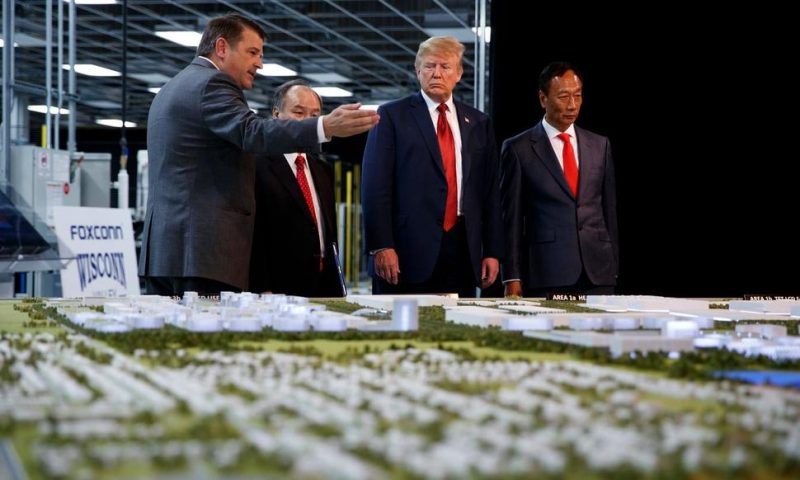Foxconn Technology Group will qualify for up to $80 million in state tax incentives under a new contract that downsizes the scale of credits as the size of the envisioned manufacturing facility has also shrunk.
MADISON, Wis. — Foxconn Technology Group will be eligible for just $80 million in taxpayer subsidies under a new contract signed Tuesday, down from nearly $3 billion it could have received under the original deal that envisioned a much larger project in southeastern Wisconsin.
Democratic Gov. Tony Evers, who ran in 2018 as a critic of the deal that his Republican predecessor struck with the world’s largest electronics manufacturer, announced details of the new contract after it was approved by the Wisconsin Economic Development Corp. during a closed session.
“The last deal didn’t work for Wisconsin, and that doesn’t work for me,” Evers said. “Today I’m delivering on that promise with an agreement that treats Foxconn like any other business and will save taxpayers $2.77 billion, protect the hundreds of millions of dollars in infrastructure investments the state and local communities have already made, and ensure there’s accountability for creating the jobs promised.”
Under the original deal, signed in 2017, Taiwan-based Foxconn would have qualified for $2.85 billion in state tax credits if it invested $10 billion and created 13,000 jobs. Under the new deal, Foxconn will qualify for $80 million if it employs 1,454 people with an average wage of $53,875 and invests $676 million by 2026. Under the original deal, when taking into account local government incentives, the taxpayer subsidies for Foxconn totaled more than $4 billion.
The new contract is good for six years rather than 15. It also allows the state to recover 100% of incentives paid each year in the event of a default.
Both Evers and Missy Hughes, secretary of the state economic development agency, said the amended contract would treat Foxconn the same as other businesses.
“By right-sizing the contract, our state is in a position where we can ensure that all businesses – everywhere – have the resources they need to grow and prosper,” Hughes said.
Foxconn, best known for making Apple iPhones, said in a statement that the new contract will give it the “flexibility to pursue business opportunities in response to changing global market conditions.” Foxconn said the original projections for the project have “changed due to unanticipated market fluctuations.”
The Evers’ administration had informed Foxconn that the project was no longer in compliance with its original contract and therefore would not qualify for tax incentives tied to job creation and investments by the company. The two sides have been working on a new deal for more than a year.
Its sprawling campus is 2,500 acres (1,012 hectares).
Then-President Donald Trump heralded the original deal as a sign of a revitalized American manufacturing economy, calling the envisioned plant “transformational” and the “eighth wonder of the world.” But skeptics, citing other Foxconn promises that never came to pass, questioned whether the Wisconsin project would be as massive as planned.
What exactly Foxconn will make in Wisconsin has changed since it signed the first contract in 2017 under then-Gov. Scott Walker. At that time, Foxconn said it planned to build large, flat screen panels at the plant. However, the company’s chairman said earlier this year might make electric vehicles at the facility.
The new contract allows Foxconn to earn the incentives with no specific requirement on what it makes. The original contract was tied to Foxconn producing the flat screens it initially said would be made there.
State Sen. Dan Feyen, a Republican who is also on the economic development board of directors, said the Wisconsin plant will be used “for the manufacturing of data infrastructure and other operations related to high-performance computing, cloud computing, and artificial intelligence.”
“This project and commitment to our state is a transformational opportunity for our Wisconsin, and I am proud to support these family supporting jobs,” Feyen said. “The contract amendment will protect taxpayers while providing state incentives that make the Foxconn’s changing future in Wisconsin possible.”
Wisconsin Assembly Speaker Robin Vos, whose district includes the Foxconn factory, said, “Hopefully we can now put the politics surrounding the development behind us and focus on the partnership that continues to benefit all of Wisconsin.”

